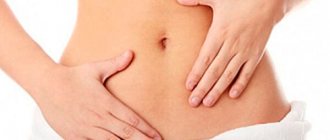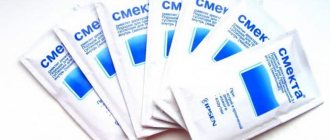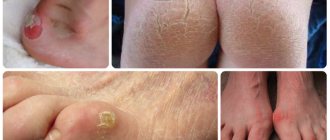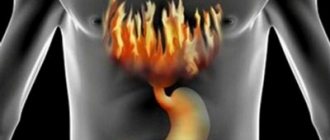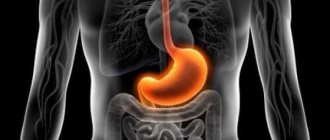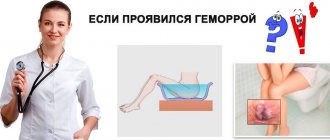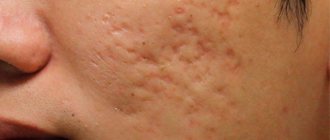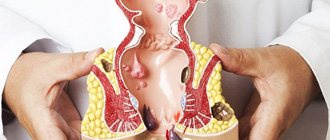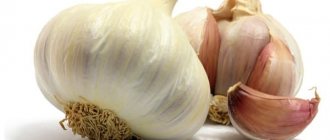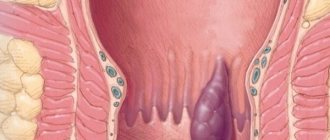Causes of acne formation
Various diseases of the internal organs lead to a rash on the face. Improper diet with excess sweet and fatty foods, nervous overload, and incorrectly selected cosmetics contribute to the development of the disease. With insufficient facial hygiene, the skin is poorly cleansed from harmful environmental factors and the pores become clogged with dead skin cells along with particles of dust and dirt.
Diseases that lead to acne:
- Disruption of the endocrine glands. Acne on the face often forms during the period of hormonal changes in the body (teenagers, pregnant women, premenopausal women). Acne appears before menstruation in women, when the production of steroid hormones is increased. Sometimes endocrine diseases (diabetes mellitus, obesity, dysfunction of the pituitary gland and adrenal glands) contribute to the appearance of acne.
- Diseases of the gastrointestinal tract. Acne can appear due to dysfunction of the liver, stomach or intestines. With constipation, harmful substances begin to be absorbed through the intestines back into the blood, toxins are released through the skin, and a rash appears.
- Skin pathology (infection, hyperkeratosis).
Types of acne by appearance:
- Acne. Small pimples are red in color and increase in size as they mature. A white head forms, and pus is released from the top after opening. Such acne often appears during adolescence. In adults, acne occurs with endocrine diseases, pathology of the stomach and intestines.
- White pimples. They are formed when the sebaceous glands malfunction at any age. Diseases of internal organs contribute to their development.
- Pink pimples. Appear in the area of small capillaries on the skin. A common cause of their occurrence is gastritis with low acidity.
- Blackheads. They are formed as a result of blockage of the ducts of the sebaceous glands due to poor nutrition, obesity, and constipation.
- Medicinal acne. Appear when taking steroid drugs, excess bromine, iodine, or exposure to chemicals orally or in the form of ointments.
Why do acne appear with gastritis?
Gastritis is often caused by the pathogenic microorganism Helicobacter pylori, which contributes to the development of atopic dermatitis. Rashes of various types appear on the face and body. Acne with gastritis occurs in the form of areas of skin redness, blisters or swelling. The rashes are accompanied by itching; when scratching, an infection occurs, then pimples with purulent contents form. Often such dermatitis appears in children, and in adults it recurs with a decrease in immunity.
In people over 40 years of age, Helicobacter causes pink acne; women are more often affected. In addition to the skin, the mucous membranes of the eyes are affected; at the same time, patients complain of photophobia and lacrimation.
With gastritis with low acidity, a violation of the absorption of vitamins and microelements occurs, anemia occurs, which contributes to the development of dry skin and the appearance of acne on the face.
What rashes appear on the skin due to intestinal disease?
Cutaneous vasculitis is a lesion of blood vessels. It manifests itself as uncharacteristic rashes, often located symmetrically in the area of the lateral surfaces, buttocks, thighs, abdomen, and swelling. In addition to blood vessels, cutaneous vasculitis also destroys subcutaneous tissue, gradually spreading deeper and deeper. If left untreated, it can lead to necrosis, which over time transforms into gangrene.
Vegetating purulent stomatitis . Clinical picture: damage to the oral cavity occurs, with the characteristic formation of blisters, in the place of which, after opening, ulcers appear. However, most often this form of stomatitis is characterized by redness of the lateral surfaces of the tongue, purulent plaque, dryness and increased temperature.
Diagnostics
With gastritis caused by Helicobacter pylori, increased acidity is often observed. The disease is characterized by complaints of heartburn and abdominal pain. With atrophic gastritis, the acidity of the stomach is reduced, gastrointestinal motility is often impaired, and constipation occurs. The skin becomes pale and dry due to concomitant anemia and impaired absorption of vitamins and microelements.
To detect gastritis, fibrogastroduodenoscopy is performed with examination of a piece of the gastric mucosa for Helicobacter. The microorganism can be detected by detecting antibodies in the blood or using a breath test. Gastric acidity is examined using intragastric pH-metry. Only after an examination is the correct treatment prescribed; therapy is carried out by a cosmetologist together with a gastroenterologist.
Special diet
People with gastritis need to exclude very fatty, salty and spicy foods from their menu. Harmful mayonnaise as a salad dressing should be abandoned in favor of vegetable oils (sunflower, olive, flaxseed, etc.). Fatty pork should be replaced with leaner beef and poultry.
Diet will help quickly cure gastritis
Be sure to include fresh vegetables and fruits in your diet to provide the body with vitamins and microelements. This item can be replaced by taking a multivitamin complex, the choice of which should be consulted with your doctor. In particular, vitamins A and B5 are involved in the restoration of the gastric mucosa.
It is not necessary to categorically refuse confectionery and bakery products, but their consumption should be limited, since sugar is an excellent breeding ground for the proliferation of pathogenic microorganisms. For dessert, it is still recommended to eat a fruit or a handful of dried fruits. Also subject to restrictions are milk and its derivatives, any fish, citrus fruits, coffee, chocolate, and nuts.
These simple diet rules will help the patient recover faster and get rid of acne on his face.
Treatment
For gastritis, treatment begins with diet. Limit the intake of fatty, fried foods, and exclude a lot of carbohydrates. It is acceptable to eat proteins (lean meats and fish, skinned chicken), grains, and dairy products. The diet must be enriched with a large amount of vegetables and fruits, which will become a source of vitamins and microelements and cleanse the intestines of toxins. You should drink about a liter of still water per day. It is advisable not to drink strong tea and coffee, and avoid alcohol.
Drug treatment
To eliminate acne, you will need to cure the underlying disease.
If Helicobacter pylori is detected, treatment is carried out. Antibacterial drugs are prescribed according to the schedule. Among antibiotics, the choice is made on drugs of the ampicillin group and macrolides. In addition, bismuth preparations and agents that reduce stomach acidity are recommended. Treatment is carried out by a gastroenterologist under the supervision of endoscopy and tests for Helicobacter pylori. The drugs should be used for at least two weeks.
Acne due to gastritis with low acidity is treated with the use of drugs that enhance the formation of gastric juice (calcium gluconate, proserin, limontar). To improve digestion, enzyme preparations containing components of gastric juice (pepsin, panzinorm) are prescribed. With such gastritis, anemia with deficiency of folic acid and vitamin B12 often occurs; the treatment complex includes taking these vitamins.
If there is constipation, normalization of stool is necessary. In addition to a diet rich in fiber, it is recommended to take laxatives or drugs that improve gastric and intestinal motility (buscopan, duspatalin). To remove toxins and waste, activated carbon, polyfipan, enterosgel are used, and they are consumed orally. Cleansing enemas and colon hydrotherapy will help cleanse the intestines. Blood purifying procedures are recommended - plasmapheresis, hemosorption.
In addition to the main treatment, it is recommended to undergo a course of physiotherapy, correct the immune system, and take a vitamin complex.
Local therapy
Local acne treatment is carried out by a cosmetologist. You cannot squeeze out acne on your own; it can easily cause infection and damage the skin, which will increase inflammation. For minor rashes, it is sufficient to prescribe external agents in the form of lotions, creams or ointments.
How will your skin condition change after cleansing?
When there are gastrointestinal problems and acne appears, it is recommended to undergo some tests to study the microflora and identify possible diseases.
After the examination, you will have a clear idea of the problem and the doctor will be able to select effective medications for the treatment and concomitant elimination of the rash.
Acne and the intestines are connected by the fact that microorganisms, when the intestinal mucosa is diseased, release toxic substances that are dangerous to each organ. They lead to decreased immunity and poisoning of the body. As a result, the protective function of the skin decreases; it becomes susceptible to opportunistic microflora and various infections that penetrate through microtraumas.
The skin loses its barrier function, this is complemented by a violation of the secretion of the sebaceous glands, which further contributes to the appearance of acne. The ducts of the gland are clogged with sebum, and this is an ideal condition for the activity of pathogenic microorganisms. Accumulating, they form an inflammatory focus, then, together with the blood, the infection is transferred to other areas of the skin.
Acne map
Much time has been devoted to studying the nature of acne, and observations by dermatologists have shown that the location of acne is not random. The location where acne appears gives information about which organ is affected. The map helps the dermatologist refer a person to the right specialist.
Map of the location of acne on the face:
- cheeks – the problem should be looked for in the organs of the respiratory system, acne appears with frequent colds and in the case of chronic bronchitis;
- chin - acne appears in this place due to frequent stomach problems;
- whiskey - rashes indicate a dysfunction of the gallbladder;
- forehead – acne appears near the hairline and between the eyebrows due to liver problems;
- nose - when you have a rash, you should look for the problem in the lungs and bronchi.
Treatment of any disease must be comprehensive. If a doctor prescribes medications, this should be supplemented by changes in diet and elimination of unfavorable factors.
According to scientists, the problem is quite clear and lies in the knowledge of microbiology. Some microorganisms, during their life, leave toxins inside the human body. Even the smallest accumulation of these toxins causes poisoning, weakened immunity, which leads to skin problems. Consequently, the functioning of the sebaceous glands is disrupted and acne begins to form.
Let's try to clarify the question of why acne appears due to the intestines or stomach. The connection here is actually quite simple. You just need to turn to general physiology, which every initial medical student is familiar with. As you know, skin quality is directly related to the level of immunity.
Deep cleansing (colon hydrotherapy), based on water rinsing of the body, is performed only in medical institutions.
- Underwater washing;
- Intestinal irrigation according to Lensky.
These methods are not associated with pain and do not cause discomfort to patients.
The essence of the method: using a special APKP apparatus, medicinal water heated to 37 degrees is injected into the intestines in portions (1.5-2 liters). During the procedure (40 minutes), about three dozen liters of water are passed through the colon. The intestines are completely cleansed after 6 procedures.
- An intestinal tube is connected to the reservoir filled with irrigating fluid, the opposite end of which is inserted into the rectal tube;
- The intestinal probe is carefully advanced through the rectal tube to a depth of 50 cm;
- The liquid introduced into the intestines flows through a rubber drainage tube into a special vessel.
In one session, 8-20 liters of liquid will be consumed. This procedure takes no more than 25 minutes and is carried out 6-8 times every 2 days. Thanks to colon hydrotherapy, problems such as acne, parasitic infections are solved, and waste and toxins are removed. This is the fastest way to cleanse the intestines.
Contraindications to deep cleaning:
- Tumors of the intestines and stomach;
- In women - pregnancy, breastfeeding, menstruation;
- Hemorrhoids and rectal prolapse;
- Recent intestinal surgery;
- Stomach and duodenal ulcers;
- Cholecystitis;
- Pancreatitis;
- Intestinal bleeding;
- Anal fissures.
The intestines and acne on the face are closely related to each other, and it is recommended to clean this organ from time to time. But there are a number of reasons why this procedure is contraindicated:
- High body temperature.
- Headaches and weakness.
- Presence of acute diseases.
- Vomiting, nausea, upset.
- Hypertension of the third stage.
- Kidney and heart failure.
- Disease of the large intestine.
- Presence of hemorrhoids, swelling of the rectum.
You can cleanse your intestines of waste and toxins yourself. It is immediately necessary to clarify that this is not as effective as colon hydrotherapy and problems such as pimples, acne, and skin inflammations will not disappear immediately.
There are many methods of cleansing, and every other healer recommends his own universal means for removing toxins from the intestines. Often they are not only ineffective, but also cause considerable harm to the body. Therefore, you need to use only proven methods on yourself, which we will now consider in detail:
- enema;
- laxatives;
- herbal infusions;
- vegetable, castor and linseed oils;
- bran;
- fresh vegetables and fruits.
Enema
To cleanse the intestines of toxins, you need to take a special container with a rubber tube and tip (enema) and fill it with water that has been previously boiled and cooled to room temperature. Then lie on your side, bend your knees and insert a tip lubricated with vegetable oil into the anus. After all the liquid has been introduced into the intestines, it is necessary to remove the enema and hold the water inside for 10 minutes, and then visit the toilet. You can rinse the intestines with herbal infusions, solutions of potassium permanganate and many other useful substances.
Colon cleansing preparations are divided into the following groups:
- osmotic laxatives, which help pump fluid into the intestines;
- bulk laxative substances that stimulate the evacuation function of the intestines;
- chemical laxatives based on buckthorn, hay, castor oil.
All of the above remedies, being absorbed by the intestines, solve the problem of acne and acne appearing on the face gradually, but such treatment will not have a temporary effect.
Herbal infusions
Medicinal plants with the most pronounced laxative effect are hay, plantain, rhubarb root, fennel, buckthorn, zoster, flax seed. Infusions of these herbs, passing through the intestines, help remove toxins and waste from the body.
- Pour 50 g of buckthorn and 300 g of prunes into eight glasses of water, bring to a boil and simmer over low heat for 25 minutes. Then add another 100 g of rose hips to the pan and boil for 45 minutes. The resulting broth should be left to infuse overnight, and in the morning, strain and refrigerate. It is recommended to drink the infusion 100 ml daily, for two weeks in a row;
- Pour boiling water over hops, calendula and coltsfoot in proportions 1:2:1 and let it brew. Take a few sips daily.
Important! All medicinal plants have their contraindications and their permissible doses. By ignoring such moments, you can create a situation where acne not only does not disappear, but there are many more of them. Therefore, consultation with a doctor is mandatory.
Bran
Bran is the shell of grains containing a large amount of fiber. You need to eat 2 tablespoons of bran three times a day 15 minutes before meals and wash it down with still drinking water. Exceeding the frequency and dose of their use may cause stomach problems (for example, flatulence). The course of treatment with bran is 1 month. This is one of the safest ways to cleanse your colon and thus fight acne.
Natural oils
- Take 1 gram of castor oil per kilogram of weight, heat it in a water bath and drink in one gulp. You need to drink the oil with pure lemon juice. The last meal before consuming oil should be lunch. Once in the intestines, castor oil has a strong effect, and therefore this method of cleansing is prohibited for children under 14 and those suffering from ulcerative colitis, oncology of the digestive tract;
- Place 250 grams of flax oil and 100 grams of flaxseeds in a dark glass container and leave for 7 days. The resulting mixture should be consumed three times a day, an hour before meals. Cleansing the intestines in this way is contraindicated for patients suffering from pancreatitis, hepatitis and cholelithiasis. The cleansing effect is observed within a month: inflammation is relieved, skin color improves, and acne decreases in size.
It is difficult to imagine that anyone would voluntarily undergo a procedure such as colon hydrotherapy. At least until there are so many pimples that people start shying away. We are talking about a cleaning method that involves the use of special devices and is capable of providing a comprehensive “washing” of the digestive system.
There are many treatment methods. One of them is treatment with certain antibiotics and drugs that help restore the microflora after long-term stress. Don’t hesitate to choose deep complex treatment, and if you have a serious problem with your stomach, go to the hospital immediately.
Let's consider special preparations for the intestines for acne. First of all, they are divided into several categories:
- Laxatives containing buckthorn.
- Castor oil.
- Bulk laxative pharmaceutical preparations.
- Osmotic laxatives.
Causes of acne
Acne is an inflammatory process that affects the human skin surface. They arise due to increased activity of the sebaceous glands. They can affect any surface of the body, most often located on the face, back, shoulders and chest. The nature of their origin has several forms. The main causes of skin rashes are diseases:
- endocrine system. Diabetes mellitus, obesity, and pathologies of the adrenal glands are directly related to the appearance of a rash. Hormonal imbalance becomes a frequent ally of acne. It is typical for adolescents, pregnant women, and women during premenstrual syndrome;
- gastrointestinal tract. Toxins come out through the skin in the form of pimples that are not eliminated from the body naturally;
- vegetative system;
- skin (hyperkeratosis).
The occurrence of skin redness is also influenced by medications (hormonal, antibiotics, vitamins), heredity, and frequent stress. Poor quality cosmetics can cause an allergic reaction in the body.
The most effective medicines
Some drugs can be used not only as a means to cleanse the intestines, but also as a medicine for the stomach.
"Lactofiltrum"
This drug is often prescribed by specialists when the patient does not know how to cleanse the intestines. It belongs to the group of enterosorbents that promote the removal of toxic substances from the body. Its main active components are lignin and lactulose.
The product not only cleanses the intestinal tract, but also helps increase the population of beneficial microorganisms. It is often used after antibiotic therapy. In addition, the medicine can be used as a medicine in the following cases:
- liver pathologies;
- food allergies;
- excessive flatulence;
- problems with stool.
The tablets should be taken an hour before the planned meal so that there are no obstacles to the active action of the medicinal substances.
Adults need to take the medicine up to three times a day, three tablets per dose. Patients from the age of twelve take it according to the same scheme.
The use of the drug is permissible from one year of age. Up to three years, you can take one second tablet three times. From the age of three, it is permissible to give a child a whole capsule.
Before treating facial acne with this drug, it is recommended to first consult with a gastroenterologist.
"Carbopect"
Colon cleansing is also effectively carried out using Carbolect. This is an excellent remedy that is prescribed for the following problems with the digestive system:
- dyspeptic syndrome;
- intoxication due to intestinal infections;
- various types of poisoning;
- food allergy.
With the help of this remedy, the digestive organ is completely cleansed of toxins and other toxic elements.
Depending on the problem for which the medicine is used, the dosage regimen will be different. The selection of dosage should be done exclusively by a doctor to avoid side effects.
It is strictly forbidden to use the product for medicinal purposes in the presence of ulcers and gastrointestinal bleeding.
With long-term use of the drug, negative reactions such as stool disorders and hypovitaminosis can develop. The appearance of the latter phenomenon is due to the fact that the drug prevents the intestines from absorbing both beneficial and harmful substances.
It is not recommended to combine the medication with other drugs, as it significantly reduces their therapeutic effect.
A popular and cheaper analogue of enterosorbent is regular activated carbon.
"Polysorb"
This medicine also belongs to the group of enterosorbents that help cleanse the body of excess toxins. The main indications for use of the product are:
- dysbacteriosis;
- intestinal infections;
- severe poisoning;
- chronic liver pathologies;
- allergic reactions.
Patients with pathologies of the gastrointestinal tract accompanied by bleeding should refrain from taking the drug.
The medicine is produced in the form of a powder for the preparation of a suspension, the main active ingredient of which is silicon dioxide.
The dosage of the drug is selected individually, taking into account the patient’s age and body weight.
With long-term treatment with enterosorbent, calcium supplements are usually prescribed additionally.
"Rioflora"
Since cleansing the body is not always enough to eliminate inflammatory processes on the skin, in addition to enterosorbents, there are probiotic agents that allow you to populate the intestines with beneficial bacteria after cleansing. The most effective drugs in this category include Rioflora.
A probiotic contains several types of bacteria that can increase the population of beneficial microorganisms in the digestive tract.
The course of taking the drug ranges from two weeks to one month, depending on the severity of the disease.
The main indications for use are dysbiosis and dyspeptic syndrome.
Despite the fact that the probiotic belongs to the category of safe drugs, it is still not recommended for use in acute pancreatitis. It is also recommended that people with individual intolerance to its constituent components not take it.
"Bifiform"
Since acne occurs from the intestines, or rather when the balance of beneficial microflora is disturbed, a probiotic produced under the name “Bifiform” will be a good way to solve the problem.
The drug is often prescribed for various types of diarrhea, intestinal infections, as well as for chronic pathologies of the gastrointestinal tract.
Types of acne
Skin manifestations take different forms, depending on the cause and nature of the rash. The main types of acne are classified:
- white or comedones - can be open or closed. It is a thickened sebaceous plug that clogs the pores;
- pink - a frequent companion to gastritis with a reduced level of hydrochloric acid production. It matures in the area of small capillaries of the face, affecting the skin of the mature population;
- acne is noticeable red inflammation that can appear on any area of the skin. Starting from a small red raised dot, it gradually increases. Ripening occurs through the formation of a white top filled with pus. Most common among the younger generation. Among adults, they serve as a signal of problems with the endocrine system and gastrointestinal diseases;
- black ones are a non-inflammatory type of comedones. During its formation, sebum thickens and oxidizes. Disturbed diet, constipation, excess weight become the causes of the appearance of “black dots”;
- medicinal - occur when using medications, hypervitaminosis.
Gastritis and urticaria
Urticaria is a skin rash characterized by itching. Pimples appear ranging in size from a few millimeters to a centimeter. They have a one-time or chronic nature, and are possible in combination with Quincke's edema. More common in children than in adults. As a rule, urticaria appears on the stomach due to allergic gastritis, which occurs if food or chemicals that contain an allergen for a particular organism enter the stomach.
Medicines that cause hives:
- streptomycin;
- group of sulfonamides;
- penicillins;
- non-steroidal anti-inflammatory drugs.
The drug can provoke urticaria for 14 days.
It should be remembered that taking medications causes side effects even a few days after stopping their use. Penicillin can cause hives for up to 14 days after taking it. Food allergenic products:
Red fish, honey, chocolate, citrus fruits can cause the release of histamine. A reaction similar to an allergic one is provoked. These products are pseudo-allergenic and do not trigger the allergic process. This form of urticaria occurs in combination with a disease of the gastrointestinal tract.
Gastritis as a cause of acne
The main cause of gastritis is the bacterium Helicobacter pylori. A small green microbe, with its metabolic products, provokes the occurrence of inflammatory processes in the stomach. Various factors can push an infected organ to develop pathologies. Among them: unhealthy diet, stress, alcohol, heredity, medications.
Main symptoms of gastritis:
- discomfort in the gastric area;
- nausea, vomiting;
- impaired metabolism;
- bad breath.
The types of acne with gastritis differ. Each type of inflammation of the gastric mucosa characterizes a specific form of the disease. The allergic type is characterized by urticaria - small pale pink acne. They are localized in one area of the body, mainly on the stomach. It appears after the allergen enters the patient’s stomach. Causes irritation and itching. If, when diagnosing gastritis, the form of the course was incorrectly identified, acne can be caused by incorrectly prescribed medications.
The bacterium Helicobacter pylori simultaneously causes rashes and pimples on different parts of the body. They crush various types: blisters, swelling, redness, pustules. Small itchy inflammations are more typical for children. Adults over forty suffer from pink pimples, and at the same time the sensitivity of the ocular mucous membrane increases. Bacteria, through their vital processes, cause allergic reactions in the form of acne throughout the body.
Important! With gastritis, acne affects more than 80% of those with inflammatory processes in the gastric mucosa infected with Helicobacter.
If during gastritis the acidity of the stomach is reduced, vitamin deficiency appears. Absorption of beneficial microelements becomes difficult. It causes dryness of the skin and anemia develops.
Interesting fact! Acne on the cheeks indicates problems with the stomach - the presence of gastritis. Pink pimples, characteristic of mature women, occupy a large surface of the entire face.
Possible skin problems
Hives or rash
The pathology is a rash during which skin itching is observed. Pimples have different sizes, from 1 millimeter to 1 centimeter. They can appear once or disturb a person every time there is an exacerbation of gastritis. Often, in addition to acne, patients complain of the occurrence of Quincke's edema. Young patients are predominantly susceptible to urticaria. If we talk about the occurrence of rashes in the abdominal area, they are characteristic of an allergic disease, which occurs as a result of an allergen entering the gastrointestinal tract. An exacerbation can be caused by more than one food, but also by various medications, for example, non-steroidal anti-inflammatory drugs.
Acne or blackheads
The cause of these unpleasant problems can be not only gastritis, but also, for example, colitis. Mostly acne occurs due to disruption of the sebaceous glands and blockage of pores, which causes them to become infected. During gastritis, food is poorly absorbed by the body, so toxins are released that contribute to the occurrence of a rash. If acne and acne are caused by gastritis, the external use of various products will not bring any effect. An exclusively comprehensive approach to treatment will help get rid of them.
THIS IS REALLY IMPORTANT! Right now you can find out a cheap way to get rid of stomach pain. FIND OUT >>
Diagnostics
With the question of whether acne can occur with gastritis, it became clear that the probability is very high. However, it is impossible to judge the nature of the disease only by the presence of rashes. If the patient is over twenty years old, then the connection between acne and pathologies of internal organs is obvious. Accompanying the appearance of acne and symptoms of gastritis is a reason to urgently take care of your health. An immediate visit to a gastroenterologist is required.
Diagnosis of the disease includes mandatory procedures and tests:
- feces, urine;
- general blood analysis;
- performing fibrogastroduodenoscopy (FGDS) by swallowing a special hose with a camera and a light bulb.
Determining the pathology using the necessary procedural measures will help identify the form of gastritis, the level of acidity, and the presence of harmful microbes.
How to fight
Treatment of acne with gastritis should be aimed at eliminating the root cause that causes the characteristic symptoms. If you cannot cure the rash with topical medications, you will have to see a doctor, undergo an examination and find out the real factors influencing its occurrence.
Once the diagnosis of gastritis is made, the patient is also prescribed a strict diet. Spicy, sweet and fatty foods should be excluded from food. The recommended diet includes vegetables rich in vitamin A, zinc and omega acids.
In addition, the patient will have to give up bad habits: smoking and alcohol, and also reduce coffee consumption to a minimum. In case of acute or chronic form of gastritis, you will need to use medications strictly according to the prescription prescribed by your doctor.
Local treatment aimed at eliminating acne that has formed and relieving the symptoms of gastritis go well together. With the proper combination of medications, skin healing occurs much faster, so we must not forget about the need to visit a dermatologist.
Regular examinations help prevent the possibility of recurrence of the disease. A healthy lifestyle, proper nutrition and the use of the necessary vitamin complexes will help reduce the possibility of relapse of the disease.
Treatment
Diagnosis of inflammatory processes in the gastric mucosa implies further complex therapy. It is possible to cure gastritis with acne after finding out the cause of the disease. Next, the gastroenterologist determines the shape and type of lesion and prescribes therapy, consisting of:
- diets;
- medical supplies;
- local cosmetic procedures.
The stomach treatment process will take more than two weeks.
Diet
Proper nutrition is the basis for a balanced stomach. Inflammation of the mucous membrane requires a complete review of the diet. To begin with, alcohol and tobacco smoking are excluded. Each meal is divided into small portions; you need to eat often (five to six times a day). It is strictly forbidden to consume the following foods: spicy, fried, salty, fatty. A complete list of acceptable foods is issued by a gastroenterologist.
The chronic form of the disease involves long-term adherence to a diet. Important! Food for gastritis with increased or decreased gastric secretion will vary.
Medicines
It is worth considering that drug treatment often causes an increased appearance of acne throughout the body. This is the body's reaction to medications. To get rid of inflammatory processes, doctors prescribe the following drugs:
- antacids - to stabilize acidity. For gastritis with increased secretion, medications are prescribed that reduce its secretion. If it’s low, increase;
- antispasmodic - relieve pain syndromes. Characteristic of acute forms of inflammation;
- antibiotics, antibacterial medications - destroy dangerous microbes;
- vitamin complexes to increase immunity, replenish the body of nutrients due to a strict diet;
- enzyme agents.
Along with drug treatment, specialists can prescribe an enema to cleanse the intestines and remove toxins. Some forms of gastritis and acne are accompanied by physiotherapy when treated.
Local acne treatment
Cosmetic procedures alone are not enough to get rid of skin rashes. Maintaining a proper diet, eliminating harmful foods, habits, and taking medications eliminates the root cause. A visit to a cosmetologist will help speed up the healing of skin inflammation. The specialist will prescribe hardware procedures to help get rid of the scourge.
Acne on the face can be eliminated by cosmetic peelings and mechanical cleansing. Inflammation throughout the body is effectively eliminated by mesotherapy, wraps, laser therapy, and plasma lifting.
Local remedies prescribed by a doctor - masks, creams, lotions, medications containing antibiotics. Antibacterial drugs are popular among medical specialists: ichthyol, skinoren, Vishnevsky ointment, products based on zinc and salicylic acid. They are able to relieve inflammation and prevent further spread.
Antibiotic drugs in the form of ointments are prescribed to patients with complex rashes. They are used to speed up healing and leave fewer scars. Many products must be applied twice a day for at least a week.
Folk products are a pleasant addition. Decoctions of chamomile, calendula, aloe juice, and cucumber have found particular popularity.
The information on our website is provided by qualified doctors and is for informational purposes only. Don't self-medicate! Be sure to consult a specialist!
Author: Rumyantsev V. G. Experience 34 years.
Gastroenterologist, professor, doctor of medical sciences. Prescribes diagnostics and carries out treatment. Expert of the group for the study of inflammatory diseases. Author of more than 300 scientific papers.
Pink-red, itchy blisters are a symptom of hives. The peculiarity of a skin rash is its sudden appearance on any part of the body. The boundaries of the lesion can be localized over a large area of the skin.
Who is contraindicated in cleansing the body from acne on the face?
Our body has an unusually complex organization, which today is not fully understood. Failures in the operation of some systems will directly or indirectly affect the functioning of others. Very often, the development of pathological processes in the body is signaled not only by general malaise and pain, but also by the condition of the facial skin.
Gastritis provokes rashes on the face
Every person should know that one of the most common causes of rashes on the face is improper functioning of the digestive system.
For example, rashes on the skin of the forehead can signal a violation of the intestinal microflora and pathologies of the gallbladder, pimples on the chin can pop up due to the accumulation of toxins in the body, etc.
Of course, a person can eliminate a cosmetic defect in the form of a pimple using special cosmetics or folk methods. However, the problem will appear again and again until measures are taken to diagnose and treat the disease causing the rash.
You can cleanse the body with the help of herbal infusions. For their preparation, medicinal plants with a laxative effect (buckthorn, senna, flax seeds) are used. 20 g of buckthorn bark is poured into 2 glasses of cold water, put on fire and boiled for 20-30 minutes, then cooled and filtered. Drink 1 tbsp of the decoction. l. before bedtime. If acne has caused intestinal problems, after the first procedures the skin will become clearer.
To prepare senna infusion, 1 tbsp. l. herbs are poured with 1 cup of boiling water. The liquid is infused for 3-4 hours, then filtered and drunk completely in small sips before bed. To prepare a decoction of flax seeds, add 2 tsp of boiling water (300 ml). seeds and cook them for 10 minutes over low heat. The liquid is then shaken well to separate the mucilage from the seeds and filtered. The decoction is drunk before bed every day for 20 days.
Decoctions of herbs and fruits will help cope with acne. 50 g of buckthorn bark and 300 g of prunes are poured into 1.5 liters of water, bring the liquid to a boil and cook the raw material for 30 minutes over low heat. Then add 300 g of crushed rose hips to the pan and cook the product for another 45 minutes. The broth is left to infuse for several hours, then filtered and consumed ½ cup daily. It is advisable to eat prunes rich in fiber. If the intestines and acne are interconnected, the skin will clear up within 2 weeks.
Acne can appear not only in teenagers, but also in adults.
But if in the first case the rashes are caused by hormonal activity, then in the second the cause is often improper functioning of the intestines and liver.
Numerous studies have proven that acne and the intestines have a direct relationship.
- All information on the site is for informational purposes only and is NOT a guide to action!
- Only a DOCTOR can give you an ACCURATE DIAGNOSIS!
- We kindly ask you NOT to self-medicate, but to make an appointment with a specialist!
- Health to you and your loved ones!
And there is only one way to get rid of such rashes - by normalizing the functioning of the digestive system.
Why does hives appear?
The acute form, while the provoking cause remains intact, passes into the chronic stage. Treatment should primarily be aimed at the disease, the symptom of which is urticaria.
After recovery, the signs of the rash disappear without a trace, leaving no spots or scars. The body's predisposition to rashes of this kind must be taken into account when prescribing treatment. Diseases accompanied by rash and itching have different etiologies.
Peptic ulcer of the stomach and duodenum
Chronic diseases of the digestive system caused by bacterial infection (Helicobacter pyroli) can manifest as chronic urticaria (CU).
In addition to bacterial infection, the cause of inflammation of the mucous membrane of the stomach and duodenum with the symptom of urticaria can be:
- food allergies;
- drug allergies;
- endocrine;
- neuroregulatory.
The main method of treatment depends on the cause:
- elimination of the allergen;
- restoration of hormonal balance (for endocrine disorders);
- stabilization of central nervous system activity.
Compliance with a diet is a necessary condition for normalizing the secretory activity of the stomach. Medicinal plants that promote alkalization of gastric juice:
- St. John's wort;
- centaury;
- fennel;
- marshmallow root;
- liquorice root;
- flax-seed.
Use in the form of decoctions and infusions for 2-4 weeks.
Chronic gastritis
Pathogenic factors of hCG have the same signs as those of peptic ulcer and duodenum. In case of bacterial infection, antibiotics, diet and natural medicines are also prescribed.
The effect of gastritis on skin inflammation
Gastritis is an inflammation of the gastric mucosa ; the disorder manifests itself regardless of age. A malfunction of the digestive system affects the absorption of nutrients, which leads to skin diseases.
If left untreated, gastritis leads to the formation of pimples on various parts of the body. The external manifestations of the rash differ depending on the type of disease.
Chronic enterocolitis
Absorption disorders in the large and small intestines due to worms, bacterial infection, and antibiotic use lead to the concentration of breakdown products in the tissues, including the epithelium, causing inflammation.
What is dysentery, watch in this video:
Parasitic infestations
Nausea, loss of energy, pain in the intestines and rashes with scabies are symptoms of infection with roundworms, cat fluke, and pinworms.
The cause of an allergic reaction is the toxic secretions of parasites.
A blood test shows an increased content of eosinophils (leukocytes), as the body’s reaction to a foreign protein. Testing for worm eggs completes the diagnostic picture. Treatment is aimed at destroying parasites.
Reaction to antibiotics
Manifestations of dysbacteriosis due to the destruction of intestinal microflora by bactericidal drugs are overcome with the help of colibacterin and bifidum. Herbal medicine helps restore all intestinal functions.
The following herbal remedies are used:
- alder cones;
- snake knotweed;
- Oak bark;
- strawberries;
- blueberry berries and leaves.
Infusions and decoctions are used for a long time, at least a month.
Shigella infection
Diet, biological products for microflora, herbal mixtures with cinquefoil roots, shepherd's purse herbs, plantain - methods of complex treatment of dysentery.
Chronic pancreatitis
Inflammation of the pancreas is a disease, one of the causes of which is diabetes mellitus. The basis of treatment for uncomplicated forms is a protein diet and herbal medicine.
The cause of urticaria in diabetes is a reaction to drugs used to treat diabetes.
The use of herbal remedies for CP is necessary to prevent gallstone disease. To normalize the flow of bile, use:
- celandine;
- anise fruit;
- corn silk;
- dandelion root.
Medicinal infusions containing sedatives, antispasmodics, tannins contribute to the remission of chronic pancreatitis.
Autoimmune diseases
Diseases of the thyroid gland provoke the development of chronic autoimmune urticaria. Unlike other types, it occurs in a more severe form and does not respond to antihistamines.
HC can also be caused by rheumatoid arthritis, lupus erythematosus, and celiac disease.
Rheumatoid arthritis
Morning stiffness and the appearance of papules (dense subcutaneous nodules) are symptoms of rheumatoid arthritis. The disease is considered incurable. Treatment is aimed at weakening the inflammatory process, relieving painful manifestations, and preventing complications.
lupus erythematosus
Fever and the appearance of a specific rash on the face can be a manifestation of lupus erythematosus. The skin disease tends to affect internal organs and is then called systemic lupus erythematosus.
Therapy for lupus erythematosus consists of prescribing steroids, B vitamins, and antifever medications.
Celiac disease
Congenital protein intolerance causes chronic inflammation of the small intestine. Main features:
- intolerance to dairy products;
- chronic diarrhea;
- stomach ache;
- anemia;
- thirst.
A nonspecific sign of celiac disease that may appear is atopic dermatitis (redness and dryness of the skin). This is an allergic reaction of a weakened immune system to any external irritant.
Dermatitis can be caused by dust, wool, or food.
A lifelong diet and medications that replace animal protein are combined with treatment of associated manifestations. An immunologist or allergist monitors the patient to prevent exacerbation of atopic dermatitis.
EROSIVE GASTRITIS AND URTISH WITH ANVINCE'S EDEMA
Good afternoon. Around 2008, my lips began to swell intermittently in the morning, and sometimes a few blisters appeared on my body. I took lorotadine. After a couple of months it subsided. A year later it started again. I also took lorotadine. In May 2013, suddenly my whole body became covered in blisters, including my head. Lips are swollen. Lorotadine did not have any special effect. It was repeated every morning as soon as I woke up and in the evening at about five o’clock, as if on an alarm clock. After four days, I felt that my voice was hoarse and disappearing, and it became painful to swallow. I went to the hospital, they put me on a drip with prednisone, after which a whistling sound appeared when breathing, and I was admitted to intensive care. She spent 10 days in the hospital. Every day they gave me IVs and injections with antihistamines and stomach medications. The symptoms disappeared only after 5-6 days. I took biochemistry. Some kind of gastric titer was increased. I swallowed the probe and discovered erosive gastritis. With this they were discharged. I was prescribed lorotadine for 10 days. He didn't help. Already on the second day, hives appeared. I went to an allergist and was prescribed Parlazine and that’s it. Nick’s stomach was not treated; no chylobacteria were found. In 2014, pregnancy occurred. During pregnancy, under the supervision of doctors, I took a sip of Parlazine. Urticaria persists with stable strength. Parlazin holds it back, there is no swelling either, but it doesn’t go away. I did an ultrasound of the INTERNAL ORGANS, the liver is normal, the kidneys are normal, the pancreas is normal, the gallbladder has bends and isthmuses. I passed biochemistry - the norm is everywhere. At the moment I feel like this allergy is raging inside, there are no external manifestations, but I feel like my throat is a little swollen, my scalp itches unbearably and I can feel the bumps under the skin. Every evening I panic that I will get sick, that I will suffocate, I can’t sleep, when I lie down I feel like the walls of my throat are touching and it seems that my throat is swelling and I won’t be able to breathe. That is, parlazin restrains visible manifestations, but inside everything is boiling. Sometimes it happens that I eat something and my stomach and intestines are immediately upset, allergic. There is pain in the esophagus, although when I swallowed the probe they found nothing, only erosive gastritis. There are rashes on the skin in the form of neurodermatitis. I took all the panels during pregnancy, everything was negative. Including antibiotics, analgin and anesthesia.
Nutrition and vitamins for skin rashes due to gastritis
Treatment of gastritis involves, first of all, following a certain diet that is gentle on the stomach. You may need to completely stop smoking and drinking alcohol and coffee. Your diet should not contain fatty, smoked, very salty foods, or spicy seasonings. Add pureed and steamed dishes to your menu. Meals should be fractional - you should eat at least 5 times a day in small portions.
In the treatment of gastritis, certain vitamin preparations are effective, in particular vitamin B5 and vitamin U. Thus, pantothenic acid (vitamin B5) has a powerful reparative effect on the mucous membranes. If there is a lack of pantothenic acid in the body, excess hydrochloric acid may form in the stomach. Increased doses of pantothenic acid, on the contrary, inhibit the secretory function of the stomach.
Pantothenic acid also stimulates intestinal motility. Vitamin U (methylmethionine sulfonium chloride) helps reduce gastric secretion and provides an analgesic effect.
Treatment of gastritis involves, first of all, following a certain diet that is gentle on the stomach.
Pantothenic acid and vitamin U are contained in the optimal dosage in Doctovit.
In 90% of cases, within a few weeks you will feel the results of the treatment and see positive changes on your skin. However, even the most effective treatment does not save you from a possible relapse. Therefore, you should carefully listen to your body and adhere to the rules of a healthy diet in the future.
Useful products for skin rashes due to gastritis
Everything that enters our body affects the beauty and health of our facial skin. And if the intestines stop functioning normally, this will certainly affect the condition of the skin. If you have rashes on your face, you need to stop drinking alcohol, fatty, salty and sweet foods and enrich your diet with foods that are good for your intestines.
What tests are done for urticaria?
Hives are an allergic reaction, so tests are aimed at identifying the allergen. The dermatologist decides which tests to take. The following tests may be prescribed to the patient:
- Blood analysis. An increased white blood cell count indicates an infection causing a rash on the body. Eosinophils indicate the presence of a foreign protein secreted by the virus. The ESR level shows the state of the immune system.
- Analysis of urine . Toxins in the kidneys occur during genitourinary infections, and because of this, an allergic reaction appears on the skin.
- Biochemistry of blood . Reactive protein indicates inflammation, AST and ALT antibodies indicate the toxic effects of drugs on the body. Bilirubin shows the condition of the liver, creatine – the functioning of the kidneys, urea – the condition of the excretory system, glucose – the functioning of the pancreas. Any indicator outside the normal range helps to understand the nature of urticaria.
- Stool analysis
. Parasites release toxic substances and disrupt digestion, leading to skin rashes. - Smears for genital infections . Sometimes the cause of urticaria is pathogenic microflora, so the patient takes smears from the vagina, urethra, and intestines.
- Allergy tests (blood tests for allergies) are taken if there is a suspicion of a food allergy.
- Antinuclear factor analysis
. Autoimmune diseases cause the body to destroy its own cells, leading to allergies. - A skin biopsy
is taken if cancer is suspected.
How does urticaria manifest itself: symptoms start small
Sometimes the rash appears the day after the trigger, sometimes a week passes before an allergic reaction occurs. The most unpleasant thing is the severe itching caused by red spots on the skin. In the mild phase, if there is no constant factor, the urticaria goes away.
During an exacerbation, the skin becomes dry, covered with a crust, which begins to bleed from constant scratching. Droplets of ichor are visible on its surface. The itching worsens at night. The patient's temperature rises, he cannot sleep normally, he feels hot and uncomfortable. The constant itching is exhausting and there is no escape from it. The acute period lasts several weeks.
Urticaria (urticaria) in an advanced stage is manifested by the following symptoms:
- A person wakes up in the morning and sees swelling on the face and body.
- During the day, the skin becomes covered with tubercles and blisters, which turn red in the evening.
- During the night, the blisters swell so much that they completely merge, forming a crust.
- The body is very itchy, the patient cannot sleep normally, often wakes up and scratches the rash.
The main symptom of urticaria is a skin rash. It is localized on the legs below the knee, arms from wrist to elbow, neck, chest. The itching can be so unbearable that the patient scratches the skin until it bleeds, and ulcers appear in some places.
In severe cases, a person’s lips swell as if they were injected with silicone. Symptoms of a sore throat appear: the neck swells, it hurts to swallow, the voice deepens. If the mucous membranes of the digestive organs swell, diarrhea, bloating, and vomiting occur.
